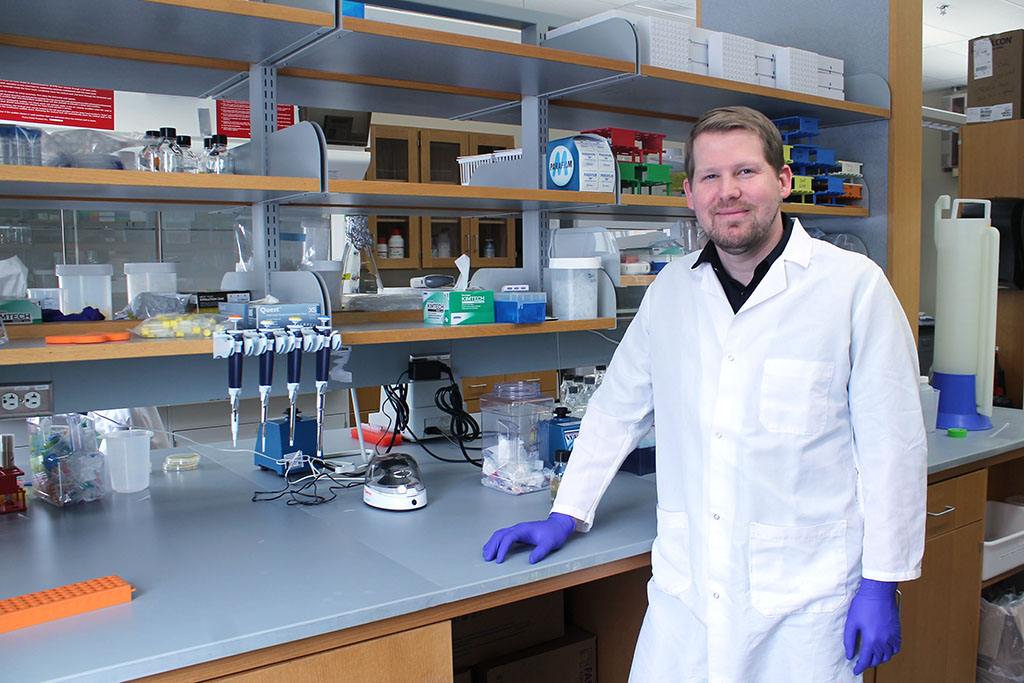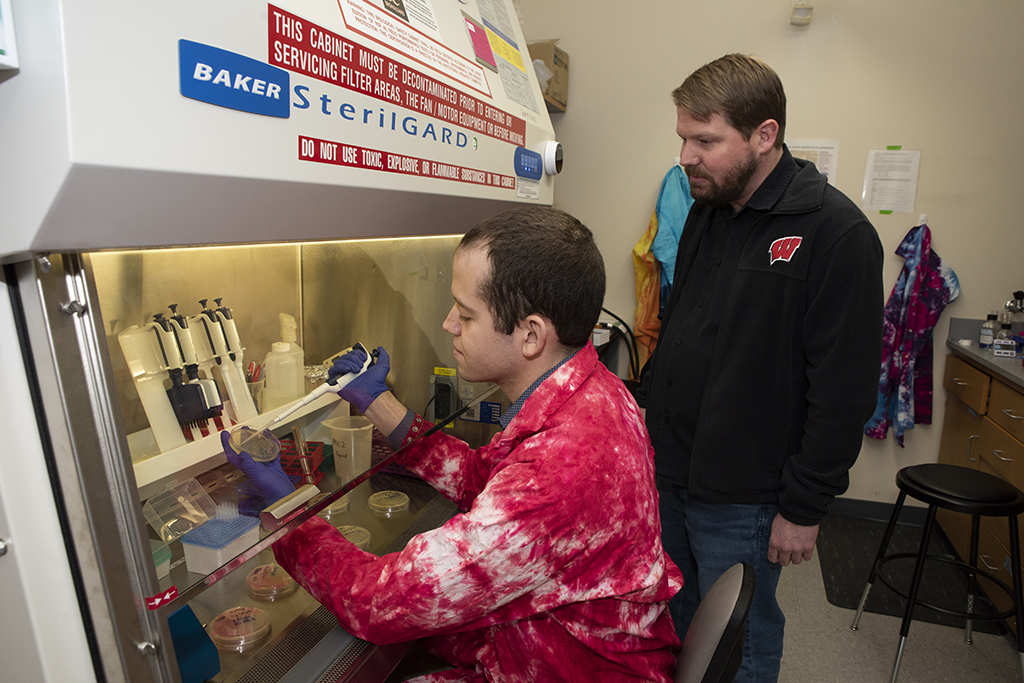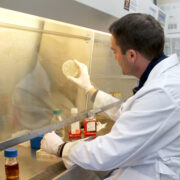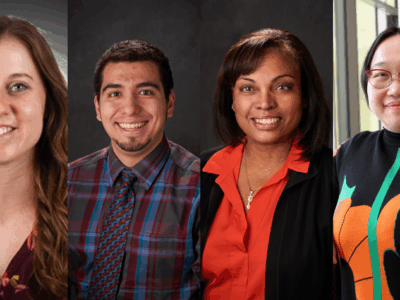
13
December

Through new NIH grant, School of Pharmacy Assistant Professor Jason Peters and collaborators are investigating bacteria viruses as a way to defeat antibiotic resistance
By Nicole Sweeney Etter
In the ongoing war between bacteria and antibiotics, antibiotics continue to lose ground. Antibiotic resistance is one of the most pressing problems facing human health, according to the World Health Organization, and without urgent action, the agency fears we’re headed for a post-antibiotic era.
“Some organisms have just become completely resistant to all antibiotics. Some are resistant to most antibiotics, and the antibiotics they’re still susceptible to are kind of nasty ones that you don’t necessarily want to use,” explains Jason Peters, an assistant professor in the University of Wisconsin–Madison School of Pharmacy’s Pharmaceutical Sciences Division. “We really don’t want to end up in a future where there aren’t any antibiotics to use. And certainly, we don’t want to end up in the present time, when we’re running out of alternatives and have to use antibiotics that, unfortunately, have a lot of side effects.”

But nature has designed a powerful weapon against even the toughest of bacteria: bacteriophages, or phages for short. Named for the Greek word that means “to devour,” these ubiquitous viruses outnumber every other organism on Earth, infecting and killing countless bacteria every day.
Peters, along with collaborators Joe Bondy-Denomy and Danielle Swaney at the University of California San Francisco, was recently awarded a grant from the National Institutes of Health to study bacteriophages as a possible alternative to traditional antibiotics.
“Our goal for this grant is to try to understand how the phage infects the bacteria and what it really needs, and to see if we could make that phage more effective at killing bacteria,” Peters says.
If proven effective, patients with bacterial infections could one day receive a cocktail of bacteria-devouring phages — which are harmless to human cells — instead of antibiotics.
Refining an old therapy
The first known use of phage therapy was in 1919, when doctors in a Paris hospital successfully used it to treat a severe case of dysentery. In the years that followed, phage research and therapeutic use grew around the world, but success was spotty, and phages were all but abandoned once antibiotics became the standard of care. While some areas in Eastern Europe still use phage therapy to treat bacterial infections today, in the United States, doctors only rarely turn to it for “compassionate use” cases where there are no other options.
“We think there’s a lot of promise to revive this old technology that people have used in the past,” Peters says.
Earlier researchers hadn’t unlocked how to use phages most effectively, he notes.
“There are a lot of limitations,” he says. “Not all phages are going to work on all bacteria, and it’s hard to know exactly if your phage cocktail — which would be a mix of phages that you hope would attack the bacteria — will be effective. And so that’s one of the reasons why it lost favor.”
Understanding bacteria’s biggest foe
Fortunately, the tools of modern biology make it possible for today’s phage researchers to explore what previous generations could not. Peters has developed CRISPR tools that allow him to test which genes are involved in phage killing of bacteria or resistance to a phage attack — something that would not have been possible until a decade ago.
“I’m very excited about the possibilities that CRISPR has for improving phage use for therapeutics. The more tools we have in the toolbox, the more likely we are to be able to overcome these antibiotic resistance problems,” he says.

For this project, the research team is focusing on Pseudomonas aeruginosa, a hard-to-treat bacterium that can infect the blood, lungs, and other parts of the body. Peters loves the research potential of bacteria.
“Bacteria are an amazing experimental system,” he says. “The ability to grow billions of cells in less than 24 hours really means that if something is an extremely rare event, you can actually see it pretty easily. If you think about the Powerball odds, those are extremely low. But I can see events happening in bacteria that are one or two orders of magnitude more rare than the winning of the Powerball — overnight. It’s pretty hard to beat that.”
That work could yield new insights into how to optimize phage therapy.
“We generally think that phages are pretty good at infecting bacteria, but they could always be better,” he says. “If you had a compound like a drug that would act on some part of the bacterium that would work together with the phage, you could make the phage work better. That’s kind of the dream scenario. But before we can even get to that point, we really need to understand what to target.”
The power of partnership
It takes research partnerships to get a full picture of the problem, Peters notes. Bondy-Denomy is an expert in phage biology who knows how to identify the best phage matches for bacteria, while Swaney brings expertise in quantifying proteins and interactions between proteins. Meanwhile, Peters’ lab uses genetic tools to identify what genes are important for those interactions.
“Together, we can see what overlap there is between the genes that are functionally important and which proteins are actually involved in the phage infection process, and with that information, we can learn a lot more than we could with any individual approach,” he says.
Industry is also starting to take note of phages’ potential.
“People are considering the clinical impact of phages now more than they ever have,” Peters says. “The fact that there are companies that are interested in this now is a good sign, and it’s a sign that if we do basic research on this, there could be an applied route.”
The applications could go beyond defeating superbugs.
“I can see events happening in bacteria that are one or two orders of magnitude more rare than the winning of the Powerball — overnight. It’s pretty hard to beat that.”
—Jason Peters
“The biology of the phage and bacteria interaction is very fascinating because it’s a process that occurs greater than trillions of times a day,” Peters says. “It occurs all over the world, everywhere, in every environment. And if we learn more about that, we could not only learn about its role in medicine, but also in ecosystems and everything else. So it has a pretty profound impact on science in general.”
The School of Pharmacy has been the ideal place to pursue this research, he notes.
“UW is nationally known for its microbiology prowess, so it’s a fantastic place to do microbiology. And in the School of Pharmacy, there are a number of labs that think about bacteria that are recalcitrant to existing antibiotics,” he says. “And so we can bring all those ideas together and focus more on how we might be able to translate some of those discoveries into useful ideas for people to make into products that could impact patient health. I think that’s the real thing that binds us all together here in the School of Pharmacy: We have a lot of different approaches, but our goal is the same.”






